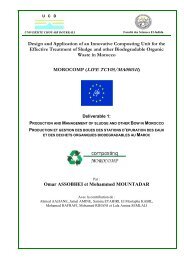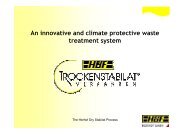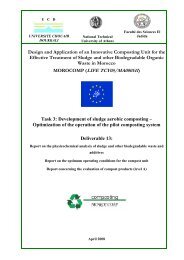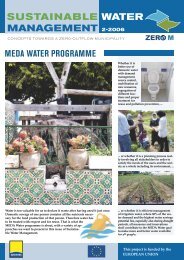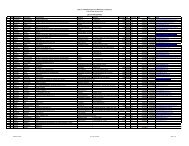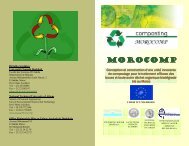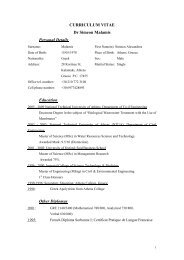(best examples and good practices) on household organic waste ...
(best examples and good practices) on household organic waste ...
(best examples and good practices) on household organic waste ...
Create successful ePaper yourself
Turn your PDF publications into a flip-book with our unique Google optimized e-Paper software.
64<br />
separate c<strong>on</strong>tainers. There are a number of varieties of the ‘collect’ system. For<br />
example, the recyclable materials are all placed in <strong>on</strong>e c<strong>on</strong>tainer; therefore the<br />
mixture has to be sorted, either by processing equipment or by h<str<strong>on</strong>g>and</str<strong>on</strong>g> at the<br />
central materials recycling facility. Alternatively, the materials may be sorted at<br />
the curbside by the collector.<br />
More sophisticated systems involve the separati<strong>on</strong> of the recyclable materials<br />
into several c<strong>on</strong>tainers or secti<strong>on</strong>s of a c<strong>on</strong>tainer by the <strong>household</strong>er for<br />
separate collecti<strong>on</strong>. The latter two systems require a more elaborate collecti<strong>on</strong><br />
vehicle to collect the separated <strong>waste</strong> streams. The advantages of the ‘collect’<br />
system include c<strong>on</strong>venience for the <strong>household</strong>er <str<strong>on</strong>g>and</str<strong>on</strong>g> higher recovery rates of<br />
recyclable materials. However, the associated costs of “collects” systems is<br />
significantly higher than ‘bring’ recycling systems since separate collecti<strong>on</strong>s or<br />
purpose-built vehicles, with separate enclosures, are required while additi<strong>on</strong>al<br />
costs are needed for the sorting <str<strong>on</strong>g>and</str<strong>on</strong>g> transport of the recyclable materials to the<br />
reprocessing facility.(Wastesum.,2010)<br />
There are many different kinds of recycling programs which can be either<br />
voluntary or m<str<strong>on</strong>g>and</str<strong>on</strong>g>atory. Am<strong>on</strong>g the various alternative recycling program<br />
alternatives the following are the most comm<strong>on</strong>ly applied:<br />
1. Return of bottle bill c<strong>on</strong>tainers or use of reverse vending machines<br />
2. Drop boxes, drop-off centers, or buyback centers for recyclables<br />
3. Curbside (kerbside) collecti<strong>on</strong> of homeowner-separated materials<br />
4. Materials recovery facilities (MRFs) for the separati<strong>on</strong> of commingled<br />
recyclables (collected at curbside, collected in drop boxes, or collected in<br />
special blue bags) using various levels of mechanizati<strong>on</strong> for <strong>waste</strong><br />
processing<br />
5. Mechanically assisted h<str<strong>on</strong>g>and</str<strong>on</strong>g> separati<strong>on</strong> of recyclables from raw <strong>waste</strong><br />
(fr<strong>on</strong>t-end processing or mixed-<strong>waste</strong> processing)<br />
6. Fully automated separati<strong>on</strong> of recyclables from raw<br />
When c<strong>on</strong>sidering all of the different types of materials that can be included in<br />
a recycling program, the various methods for segregati<strong>on</strong>, <str<strong>on</strong>g>and</str<strong>on</strong>g> the various<br />
means <str<strong>on</strong>g>and</str<strong>on</strong>g> methods of collecti<strong>on</strong>, as well as the various types of processing <str<strong>on</strong>g>and</str<strong>on</strong>g><br />
separati<strong>on</strong> systems that are available, the combinati<strong>on</strong>s <str<strong>on</strong>g>and</str<strong>on</strong>g> permutati<strong>on</strong>s seem<br />
endless. Specific expertise is required to evaluate the optimum method for a<br />
given community, based up<strong>on</strong> its populati<strong>on</strong>, geographic locati<strong>on</strong>, <str<strong>on</strong>g>and</str<strong>on</strong>g><br />
proximity to markets.<br />
There are three main methods that can be used to recover recyclable materials<br />
from MSW:<br />
1. Collecti<strong>on</strong> of source-separated recyclable materials by either the generator or<br />
the collector, with <str<strong>on</strong>g>and</str<strong>on</strong>g> without subsequent processing



